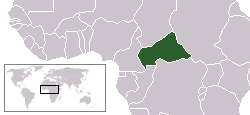The Central African Republic is a land-locked country in central Africa. It borders Chad in the north, Sudan on the east, the Republic of the Congo and the Democratic Republic of the Congo on the south, and Cameroon on the west. The CAR is situated north of the equator, separating the Congo River basin from Lake Chad and the White Nile river basin. Formerly, the French colony of Ubangi-Shari, the nation was first ruled by French plantation interests, and for three decades after it gained its independence in 1960, by military governments. While a civilian government was installed in 1993, the country's political instability remains.
Republique Centrafricaine
Ködörösęse tî Bęafrîka
|
|
National motto: Unité, Dignité, Travail
(French: Unity, Dignity, Work) |

|
| Languages |
French (official), Sangho, and various tribal languages
|
| Capital |
Bangui
|
| President |
François Bozizé
|
| Prime Minister |
Célestin Gaombalet
|
Area
- Total
- % water |
Ranked 42nd
622,984 km²
0%
|
|
Population
- Total (2003)
- Density
|
Ranked 124th
3,683,538
5.8/km²
|
Independence
- Date |
From France
August 13, 1960
|
| Currency |
CFA franc (XAF)
|
| Time zone |
UTC+1
|
| National anthem |
La Renaissance |
| Internet TLD |
.cf
|
| Calling Code |
236 |
History
Main article: History of the Central African Republic
Originally a colony of France, the Central African Republic became independent in 1960. The new nation quickly descended into dictatorship under the rule of its first president, David Dacko. In 1966 Dacko was overthrown by his cousin Jean-Bédel Bokassa who established a highly eccentric military dictatorship. In 1976 Bokassa proclaimed himself emperor and was crowned in a lavish and expensive ceremony (the shoes he wore set a world record for their costliness) based on that of his hero Napoleon Bonaparte that was ridiculed by much of the world. His human rights violations (which are said to have included cannibalism and the feeding of school children to crocodiles, amongst others) and movements against French interests prompted France to support a coup against him in 1979, restoring Dacko to power. A second coup occurred in 1981, and democracy began in 1993. In 2003 however, there was yet another coup, bringing François Bozizé to power.
Politics
Main article: Politics of the Central African Republic
The country is currently under the rule of François Bozizé. A new constitution was approved by voters in a referendum held on December 5 2004. Full multiparty presidential and parliamentary elections are due in March 2005.
Prefectures
Main article: Prefectures of the Central African Republic
Geography
Main article: Geography of the Central African Republic
Economy
Main article: Economy of the Central African Republic
Demographics
Main article: Demographics of the Central African Republic
Culture
Main article: Culture of the Central African Republic
See also:
Miscellaneous topics
Last updated: 06-02-2005 03:33:52